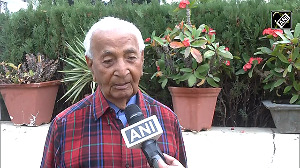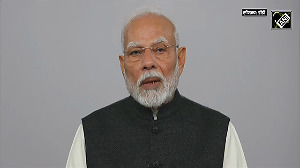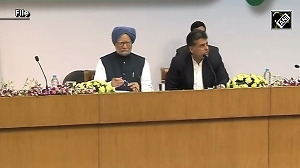Over the last four days, India has come under intense pressure from Washington -- two telephone calls from US President George W Bush to Prime Minister Manmohan Singh as well as calls from other US officials -- to back off from its tough positions.
The US wants India to agree on what it had prescribed on special safeguard mechanism (SSM) for farm products, sectoral tariff elimination for industrial goods, and other issues to facilitate the establishment of so-called modalities (parameters).
The parameters -- if established by Wednesday -- will indicate the level of tariff and subsidy cuts for farm products as well as the tariff cuts for industrial products.
"Attempts are made to isolate key developing countries and steamroll them to accept to whatever the US wants in the final commitments, which has been made possible because of sudden shifts in positions of Brazil," said a South American trade official, who preferred to remain anonymous.
India has consistently demanded flexible treatment for Special Products (SPs) and SSM on the ground that it is not an exporter and has a huge population of small farmers for whom agriculture is the mainstay. The special products enable India to take zero cuts for some vulnerable products and small cuts for the remaining products.
The SSM is an instrument, which was in vogue for the last ten years for industrialised countries in the form of special safeguard (SSG), to enable India and other developing countries who are part of the G-33 coalition to impose safeguard duties over unforeseen surge in imports that cause irreparable damage to small farmers.
Besides, India's other main demand is that global farm subsidies must be drastically lowered to enable farmers in the poor countries to compete on an even footing.
The latest compromise proposal prepared by WTO director-general Pascal Lamy on Friday allows India to have some relief on special products but totally undermines what it demanded in SSM.
In trade negotiations, where members adopt irreconcilable positions because of their core trade interest, compromises involving give-and-take are inevitable.
The WTO chief proposed about zero tariff cut for 5 per cent of farm tariff lines out of total SPs of 12 per cent. And the remaining 7 per cent of SPs will have to undergo a tariff cut of 11 per cent. Though this does not come very close to what India had demanded, the compromise is at least balanced, several developing country trade ministers said.
Up until now, India had demanded about 20 per cent of tariff lines being designated as special products with zero cut for about 8 per cent of tariff lines and the remaining products at a cut of less than 10 per cent.
But the last week's talks took an ugly turn on the issue of SSM where Lamy had proposed that safeguard duties on special products having zero cut can only be imposed if they cross the trigger 140 per cent of base imports in the previous three years.
The director general proposed a remedy (safeguard duty) with a ceiling of 15 per cent of current bound tariff of 15 ad valorem points over the current (pre-Doha) bindings.
Unlike the compromise proposal on SPs, the one proposed on SSM is almost the same of what the US and other exporters demanded without any regard to what happened during the negotiations over the last one year.
Effectively, Lamy's proposal will make the SSM on special products with zero cut redundant unless imports cross a 40 per cent trigger for three years before a remedy measure of 15 per cent is applied.
"We cannot go with a provision which would ask us to wait for an import surge of 40 per cent before we can take remedial action," India's ambassador Ujal Singh Bhatia told the informal trade negotiations committee on Saturday, suggesting that within three years, "the import surge would have wreaked havoc on the livelihoods of the most vulnerable farmers".
"We are still concerned about the inequity of SSM proposal and working to get that rectified," Commerce Secretary Gopal Pillai told Business Standard. "Without such rectification it would be difficult for India to move," he added.
In non-agricultural market access (Nama), India will pay heavily as its current bound industrial tariffs that are little over 30 per cent will come down to a level around 12 per cent. In services, India has managed to modest gains while offering its huge market to the US and the EU.
In a nutshell, India will go back home after seven years of Doha negotiations with onerous commitments and limited gains! The director general proposal cutting US' farm subsidies, which is one of the main demands of farm exporters and developing countries, the director general's proposal of 70% cut would still leave Washington to provide about US $ 14.5 billion as compared to its current spending of about US $ 7.5 billion.
This is "100% above its lowest historical level and the probable current applied level," which means "they are keeping 100% water."







 © 2024 Rediff.com -
© 2024 Rediff.com -